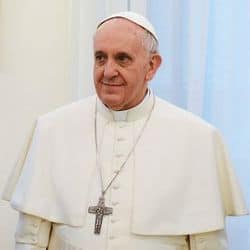 Pope Francis kicked off the Vatican's "traditional marriage" summit this week with a discussion on the state of marriage and the family in today's world – with some potentially mixed messages. In Francis' address, “The Complementarity of Man and Woman in Marriage,” he reinforces the idea of marriage and family, but it seems he might also be ambiguously referring to gay couples in several passages throughout the commentary, or at least one could deduce that he is from particular words used.
Pope Francis kicked off the Vatican's "traditional marriage" summit this week with a discussion on the state of marriage and the family in today's world – with some potentially mixed messages. In Francis' address, “The Complementarity of Man and Woman in Marriage,” he reinforces the idea of marriage and family, but it seems he might also be ambiguously referring to gay couples in several passages throughout the commentary, or at least one could deduce that he is from particular words used.
The basis of the address is based on the term "Complementarity," which means "situations where one of two things adds to, completes, or fulfills a lack in the other.” However, Francis puts the word in a Christian context.
He says:
"Christians find its deepest meaning in the first Letter to the Corinthians where Saint Paul tells us that the Spirit has endowed each of us with different gifts so that-just as the human body's members work together for the good of the whole-everyone's gifts can work together for the benefit of each (cf. 1 Cor. 12)."
Francis explains that the complementarity between women and men is the root of marriage and family, but the only other explicit mention of specific pairings between men and women doesn't occur until the very end of the address. Francis also seems to challenge traditional gender roles and recognize the suffering of women.
He continues:
"When we speak of complementarity between man and woman in this context, let us not confuse that term with the simplistic idea that all the roles and relations of the two sexes are fixed in a single, static pattern.
"Evidence is mounting that the decline of the marriage culture is associated with increased poverty and a host of other social ills, disproportionately affecting women, children and the elderly. It is always they who suffer the most in this crisis."
It's unclear what social ills Francis is referring to but with his support for civil unions and taking responsibility for sexual abuse scandals within the church, Francis' views on LGBT people and the church makes him the most progressive, socially responsible pope to take office thus far. The most telling passage of Francis' commentary is the discussion of future generations and the trappings of ideological concepts.
He says:
"It is important that they do not give themselves over to the poisonous mentality of the temporary, but rather be revolutionaries with the courage to seek true and lasting love, going against the common pattern: this must be done. With regard to this I want to say one thing: Let us not fall into the trap of being qualified by ideological concepts.
"Family is an anthropological fact – a socially and culturally related fact. We cannot qualify it with concepts of an ideological nature, that are relevant only in a single moment of history, and then pass by. We can't speak today of a conservative notion of family or a progressive notion of family: Family is family! It can't be qualified by ideological notions. Family has a strength of its own (per se)."
However, Francis ends his address with a reinforcement about marriage between men and women as a natural, unique and fundamental good, and it's unclear whether the statement about ideological trappings means Francis is willing to think beyond religious dogma, is just a simple contradiction on his behalf or an attempt to find a delicate balance between traditional ideological teachings and empathy toward the plights of LGBT people. Additionally, the fact that he invited hate leader Tony Perkins to the summit seems damaging to both his and the summit's credibility.



